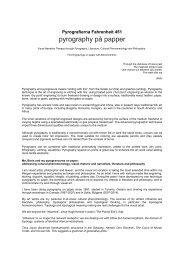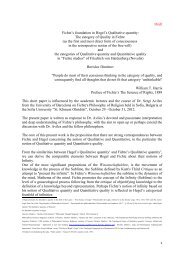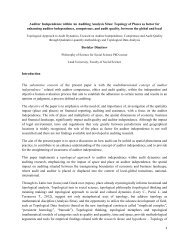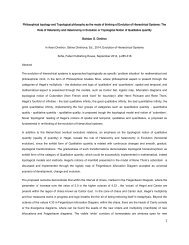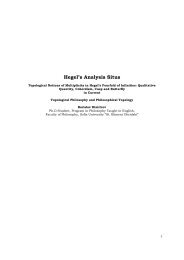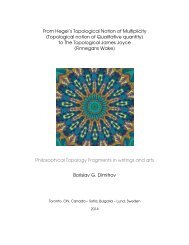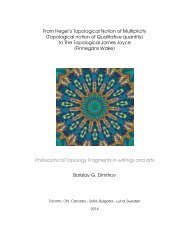Topological Ontology and Logic of Qualitative quantity
Qualitative quantity and BFO (Basic Formal Ontology) of /Barry Smith/ and YAMATO (Yet Another More Advanced Top-level Ontology) of /Riichiro Mizoguchi/
Qualitative quantity and BFO (Basic Formal Ontology) of /Barry Smith/ and YAMATO (Yet Another More Advanced Top-level Ontology) of /Riichiro Mizoguchi/
- No tags were found...
Create successful ePaper yourself
Turn your PDF publications into a flip-book with our unique Google optimized e-Paper software.
Science” (Wissenschaftslehre), Bolzano attempted to provide logical foundations for all<br />
sciences, building on abstractions like part-relation, abstract objects, attributes, sentenceshapes,<br />
ideas <strong>and</strong> propositions in themselves, sums <strong>and</strong> sets…The logical theory <strong>of</strong> Bolzano<br />
developed in his work “Theory <strong>of</strong> Science” has come to be acknowledged as groundbreaking.<br />
Bolzano was mainly concerned with three realms: (1) The realm <strong>of</strong> language,<br />
consisting in words <strong>and</strong> sentences; (2) The realm <strong>of</strong> thought, consisting in subjective ideas<br />
<strong>and</strong> judgements; (3) The realm <strong>of</strong> logic, consisting in objective ideas (or ideas in themselves)<br />
<strong>and</strong> propositions in themselves. The distinction between parts <strong>and</strong> wholes play a prominent<br />
role in Bolzano’s system. Bolzano's work “The Paradoxes <strong>of</strong> the Infinite” was greatly<br />
admired by Charles S<strong>and</strong>ers Peirce, Georg Cantor <strong>and</strong> Richard Dedekind.<br />
Bolzano’s works was rediscovered by Edmund Husserl 15 <strong>and</strong> the Polish philosopher <strong>and</strong><br />
logician Kazimierz Twardowski 16 , both students <strong>of</strong> Franz Brentano. Through Husserl <strong>and</strong><br />
Twardowski , Bolzano became a formative influence on both phenomenology <strong>and</strong> analytic<br />
philosophy. The influence <strong>of</strong> Bolzano on Heidegger is witnessed by Heidegger himself. 17<br />
The first work <strong>of</strong> Brentano On the Several Senses <strong>of</strong> Being in Aristotle (1862) <strong>and</strong> the <strong>Logic</strong>al<br />
Investigations (1900) by Husserl were at the origin <strong>of</strong> the interest in philosophy <strong>of</strong> the most<br />
authoritative exponent <strong>of</strong> Continental ontology, Martin Heidegger.<br />
If the place <strong>of</strong> ontology in modern philosophy is naturally topological, same is valid for the<br />
critical categories <strong>of</strong> ontology – quality <strong>and</strong> <strong>quantity</strong>.<br />
<strong>Ontology</strong> is the theory <strong>of</strong> objects <strong>and</strong> their ties. Topology, as a branch <strong>of</strong> mathematics, can<br />
be formally defined as "the study <strong>of</strong> qualitative properties <strong>of</strong> certain objects (called<br />
topological spaces) that are invariant under a certain kind <strong>of</strong> transformation (called a<br />
continuous map), especially those properties that are invariant under a certain kind <strong>of</strong><br />
equivalence (called homeomorphism)." To put it more simply, topology is the study <strong>of</strong><br />
continuity <strong>and</strong> connectivity. Topology is concerned only with the geometric relationship<br />
between the objects (figures) or elements <strong>of</strong> a network, not with the kind <strong>of</strong> objects or<br />
elements themselves.<br />
<strong>Ontology</strong> provides criteria for distinguishing different types <strong>of</strong> objects (concrete <strong>and</strong><br />
abstract, existent <strong>and</strong> nonexistent, real <strong>and</strong> ideal, independent <strong>and</strong> dependent) <strong>and</strong> their ties<br />
(relations, dependencies <strong>and</strong> predication). We can distinguish: a) formal, b) descriptive <strong>and</strong><br />
c) formalized ontologies.<br />
15 Hermes Scholz, Concise History <strong>of</strong> <strong>Logic</strong> (1931), English translation: New York: Philosophical Library,<br />
1961, p. 47. : "With such illogicality did things happen in the history <strong>of</strong> logic which we are pursuing here that<br />
this great, born logician fell prey to a fate which beats the fate <strong>of</strong> Joachim Jungius. For the latter at least was<br />
read, <strong>and</strong> read by a Leibniz; but that cannot even be said <strong>of</strong> Bolzano. Hence we cannot even maintain in his<br />
case that he was forgotten. All the greater is the merit <strong>of</strong> Edmund Husserl who discovered Bolzano."<br />
16 the founder <strong>of</strong> the Lvov-Warsaw School <strong>of</strong> logic, together with Alfred Tarski <strong>and</strong> Jan Lukasiewicz,<br />
Kazimierz Twardowski formed the troika which made the University <strong>of</strong> Warsaw, during that period, the most<br />
important research center in the world for formal logic.<br />
17 Martin Heidegger, Preface to: William Richardson, Heidegger. Through Phenomenology to Thought, The<br />
Hague: Martinus Nijh<strong>of</strong>f, 1963. p. X.: "The first philosophical text through which I worked my way, again <strong>and</strong><br />
again from 1907 on, was Franz Brentano's dissertation: On the Manifold Sense <strong>of</strong> Being in Aristotle."<br />
5





